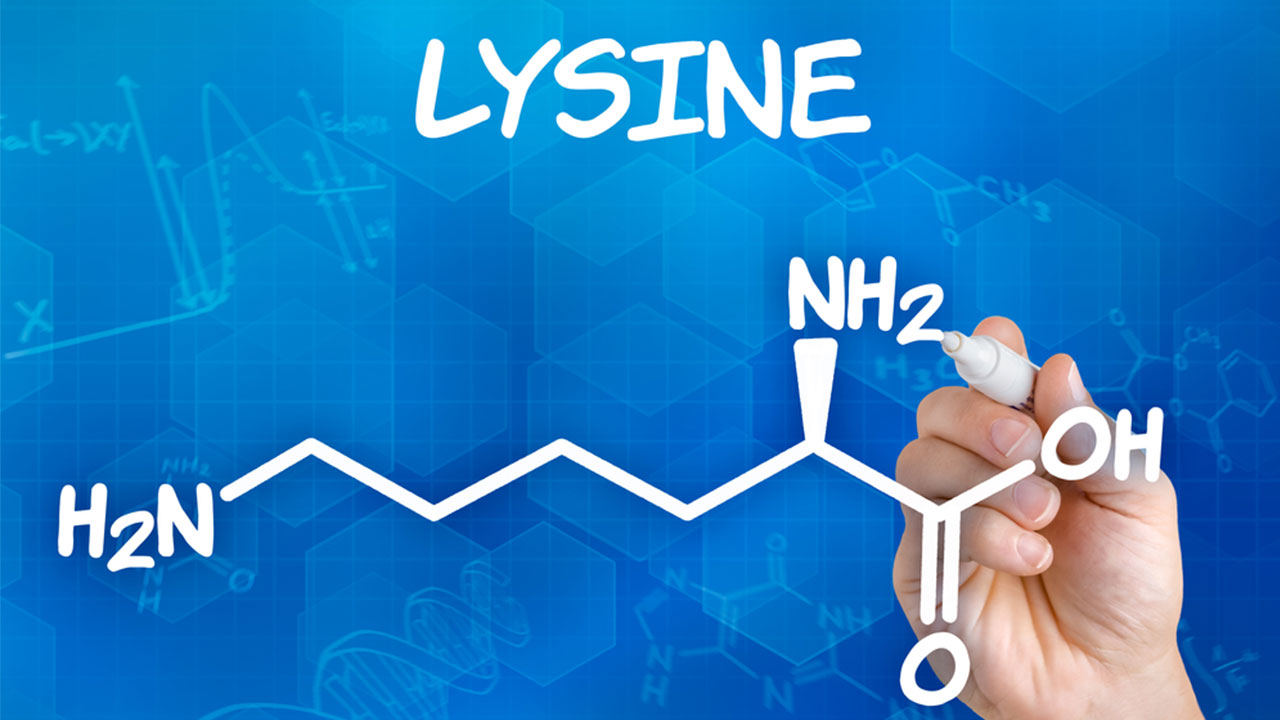What You Should Know About Lysine Supplementation
 By: by Amino Science
By: by Amino Science

L-lysine, the form of lysine used by the body—usually referred to as simply lysine—is one of nine essential amino acids. This indispensable amino acid is required for protein synthesis, collagen development, proper cell function, and tissue repair. But like the other essential amino acids, your body can’t make it on its own. You have to get it from the foods you eat or the supplements you take. If you’re interested in lysine supplementation, however, you should know that it comes with its own set of best practices.
But before we get into those, let's first talk about lysine deficiency and what may lead to a lysine-deficient diet.
Lysine Deficiency
In developed countries, such as the United States, lysine is an abundant nutrient in the majority of people’s diets, where it can be found in a variety of food sources, including:
- Meat
- Poultry
- Fish (especially cod and sardines)
- Cheese (especially Parmesan)
- Soy products
- Spirulina
- Fenugreek
- Legumes
- Nuts
However, in poor countries, where cereals are relied upon heavily for nutrition, lysine is the most limiting amino acid.
What is a limiting amino acid, you ask?
Amino acids are known as the building blocks of protein, as they create all the different proteins in our bodies by linking together in long chains. However, if any single essential amino acid is in short supply, protein synthesis will stop as soon as its supply is exhausted. The amino acid in shortest supply during protein synthesis is therefore known as the limiting amino acid.
Because the majority of cereal grains are lysine deficient, lysine becomes the limiting amino acid. And the people who rely on these grains as their main source of food are deficient in this essential amino acid as well.
Based on animal studies, every cereal grain that's been studied contains an insufficient amount of lysine. Lysine is also the most limiting amino acid in pig feed and falls just behind methionine as the second most limiting amino acid in avian diets.
In fact, over 90% of the lysine produced is used to supplement animal diets. In 2005, 200,000 metric tons of lysine was used in the United States alone to supplement animal feed.
Why do I mention this in an article about lysine supplementation presumably aimed at humans?
It’s merely to make the point that lysine is most likely the most studied amino acid in animal nutrition, yet has received far less attention for its role in human nutrition.
Still, let’s explore what we know thus far.
What Are the Symptoms of Lysine Deficiency?
Symptoms of a lysine deficiency may include:
While lysine is supplied by many animal proteins (meat, fish, poultry, eggs, and dairy products), it’s typically the limiting amino acid in plant proteins. Therefore, vegetarians, and especially vegans, must be diligent in choosing appropriate proteins or taking an essential amino acid supplement to ensure adequate lysine intake.

Lysine and Muscle Protein
Lysine is an important component of muscle tissue. In fact, it’s the second most abundant essential amino acid in human muscle protein.
Even so, lysine does not play a significant role in either molecular signaling (the communication between cells) or protein synthesis (the process of building new proteins) and is only effective in stimulating the synthesis of new muscle protein when it’s included in a mixture of all the other essential amino acids.
Muscle protein is comprised of 20 different amino acids, 9 of which are essential amino acids. However, to build new muscle protein, each of these amino acids must be available to muscle cells in a proportion that roughly matches their own individual contribution to the muscle protein amino acid profile. Lysine, however, is a bit of an outlier.
For maximal effectiveness in stimulating muscle protein synthesis, an essential amino acid formulation must contain more lysine than the amount of lysine found in muscle protein. This is because some dietary lysine may be altered during digestion, rendering it useless.
Also, once lysine is in the blood, it’s transported into muscle tissue very slowly. Therefore, it's necessary to consume higher levels of lysine to achieve an optimal balance of essential amino acids inside muscle cells.
Lysine and the Immune System
In addition to its important role as a component of muscle protein, lysine is a key player in the immune system. For example, lysine is involved in the development of antibodies and has important antiviral properties.
As a nutritional supplement, lysine has also been found to be active against certain viruses, including herpes simplex viruses.
In fact, a study published in the journal Dermatologica found that a treatment group given L-lysine monohydrochloride (1,000 milligrams 3 times a day for 6 months) had an average of 2.4 fewer infections, and their symptoms were significantly less severe and healing time significantly reduced.
The important role of lysine in immunity to infections is particularly evident when the diet is deficient in this essential amino acid.
A diet deficient in lysine not only impairs immune function but also increases the susceptibility of both animals and humans to infectious disease. Therefore, people whose diets are especially deficient in good sources of lysine, especially vegans and those from countries that rely on cereal grains, would benefit from lysine supplementation.
Those with diets that are deficient in either protein sources or amino acids in general also need to be aware of the possibility of impaired immune function. However, for these people, care must be taken when supplementing with any individual amino acid—including lysine—to support immune function.
The reason for this is that the various amino acids involved in immune function are intricately related. Of the immune system’s major amino acid players, arginine, glutamine, and cysteine are considered the most crucial for proper immune function. But lysine competes with them for transport.
In other words, an excess of lysine relative to other key amino acids may actually impair immune function. Maintaining a normal balance of amino acids in the blood is therefore critical for optimal immune system function.
Lysine and the Maillard Reaction
When you think about the amount of lysine you’re getting in your diet, you need to be aware of one other caveat: the Maillard reaction.
The Maillard reaction refers to a chemical reaction that takes place between amino acids and sugars. In fact, it’s the process that gives browned food its complex flavor (think dark coffee, toasted bread, and charred meat).
Most protein foods that have been processed in a factory are heat treated. This facilitates the formation of Maillard reactions, and these reactions are accelerated at higher temperatures.
Lysine is particularly susceptible to Maillard reactions because it possesses a reactive amino group (every amino acid is made up of one amino group and one carboxyl group) at the end of its side chain (the shorter chain of atoms attached to the main chain, or backbone, of the molecule).
Maillard products can make lysine nutritionally unavailable. By contrast, free lysine (lysine that isn't bound to other amino acids in a protein string), either alone or in a balanced essential amino acid formulation, is not subject to Maillard reactions.
Additional Benefits of Lysine Supplementation
In addition to the benefits mentioned above, a variety of other health benefits have been attributed to lysine.
Cancer Treatment
In one study, researchers found that a combination of lysine, proline, green tea extract, and vitamin C displayed an anti-tumor effect against pancreatic cancer cells.
Reduced Anxiety
Another study found that lysine was effective in reducing stress-induced anxiety and its associated diarrhea.
Improved Bone Health
Lysine supplementation was found in one study to improve intestinal calcium absorption. Studies have also found that taking lysine and L-arginine together can make bone-building cells more active and increase the production of collagen.
Lysine also works in conjunction with vitamin D to help support the assimilation of calcium and strengthen bones. For those suffering from osteoporosis, higher amounts of calcium in the body may improve bone strength and help prevent fractures.
Reduced Complications from Type 2 Diabetes
In a study of the effects of lysine on insulin and glucagon concentrations, researchers discovered that relatively high doses of lysine supplementation resulted in a small decrease in blood sugar levels and an increase in glucagon and insulin concentrations.
Another study also found that supplementation with lysine was helpful in decreasing infection risk in diabetic patients.
Improved Cardiovascular Health
Additional studies have found that, in combination with vitamin C, lysine helps form the collagen necessary to maintain artery wall strength and help prevent atherosclerosis.
Reduced Gastrointestinal Inflammation
In one study, it was found that lysine has an anti-inflammatory effect on the gut lining, which could have implications for inflammatory diseases of the gastrointestinal tract.
However, before we can definitively say that lysine is beneficial in these areas, additional controlled clinical trials will need to be performed.
Side Effects of Lysine Supplementation
While the use of lysine supplements is generally considered safe and adverse effects are uncommon, lysine has been known to cause stomach pain and diarrhea in some individuals.
There has also been one report of kidney disease linked to lysine supplements, so if you have kidney disease or are taking aminoglycoside antibiotics, please speak with your health care provider before taking lysine supplements.
In addition, lysine supplementation has not been thoroughly studied in pregnant and nursing women, so its use cannot be recommended in this population.
In conclusion, I’d like to leave you with these parting thoughts. While the research on lysine remains spotty, we can say that lysine supplementation is appropriate for individuals whose diets are specifically deficient in this amino acid.
For most other circumstances, a more balanced formulation of essential amino acids is optimal. However, as we stated earlier, because of lysine’s incomplete digestion and slow transport into muscle cells, one should look for a formula containing at least 20% lysine.

Up to 25% off Amino
Shop NowTAGS: supplements
Join the Community
Comments (0)
Most Craveable Recipes




 833-264-6620
833-264-6620



















